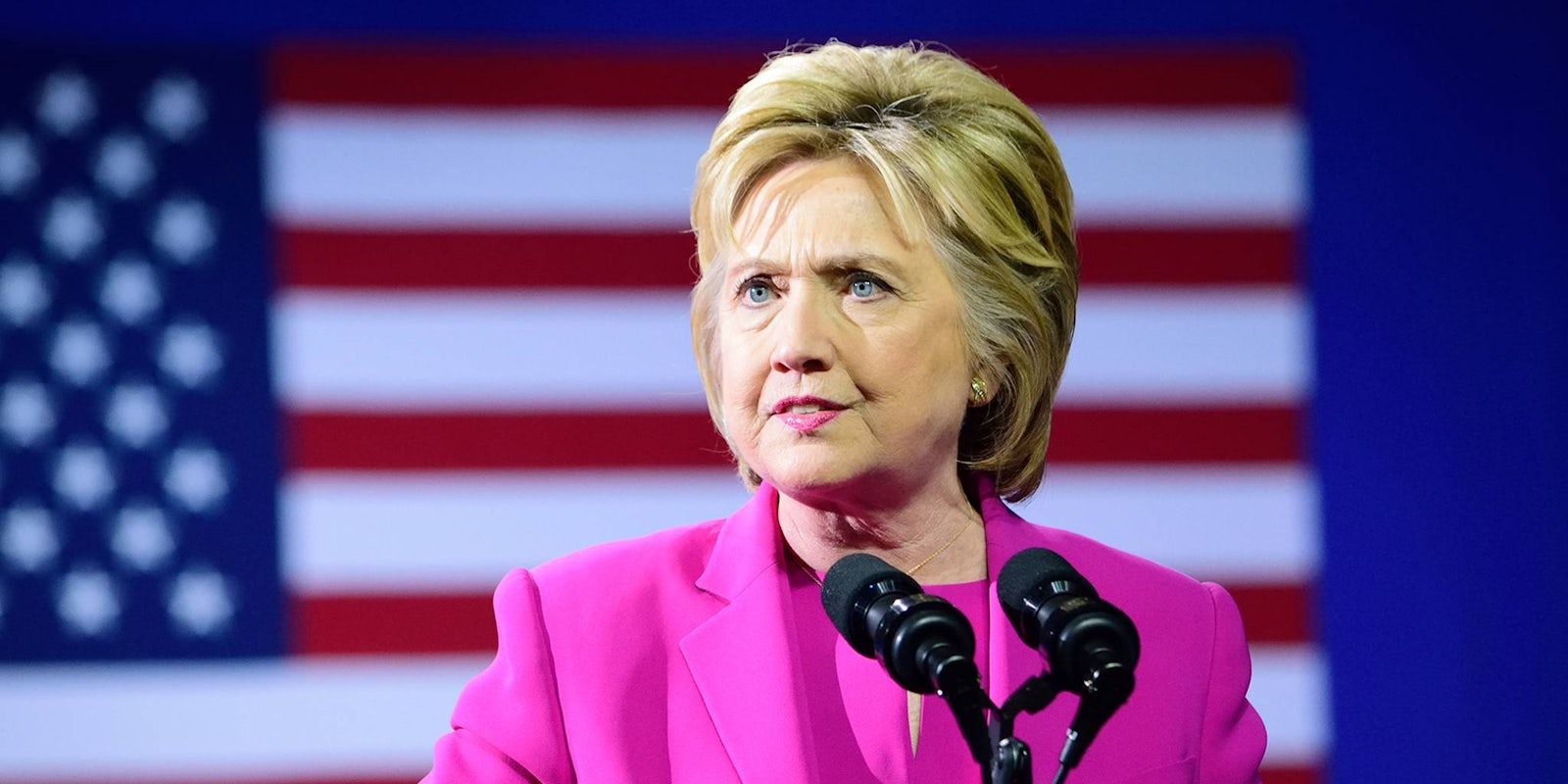Hillary Clinton ventured into hostile territory on Saturday morning, sitting down to record an interview with Chris Wallace of Fox News, which was to air on Sunday.
The Democratic nominee discussed a number of issues, including the recent DNC and Clinton campaign hacks and whether they reveal an attempt by the Russian government to influence an American election. Also up for discussion was FBI director James Comey’s criticisms of her use of a private email server.
Wallace began the interview by asking a relatively easy question: Did she believe that Russia was behind the DNC hack, and if so, was it because Russian president Vladimir Putin wanted to help Donald Trump win the presidency?
Clinton replied by running down “what we know,” although she was actually describing what’s suspected by U.S. intelligence agencies. It’s worthing noting that none of the information presented is based in publicly available information. The former secretary of state said that a Russian intelligence agency hacked the DNC, that they “arranged for a lot of those emails to be released”?ostensibly a reference to Wikileaks, which dumped the tens of thousands of emails days before the Democratic convention— and that Trump has “shown a troubling willingness to support Putin.”
She stopped short of accusing Putin of preferring a prospective Trump presidency to her own, however, saying that she wouldn’t jump to that conclusion. Instead, Clinton concluded that “laying out the facts raises serious issues about Russian interference in our elections.” Clinton’s tact on this question was notable. As Reuters detailed on Sunday, the U.S. still hasn’t publicly accused Russia of being involved in the hacks and/or leaks.
Wallace proceeded to ask Clinton why the race was so close, despite her running so heavily on Trump being clearly temperamentally unfit to serve as president. She replied that “too many Americans feel they’ve been left out and left behind,” both by the economy and the government, and suggested that Trump was trying to appeal to those people by tapping into their “frustration” and “fear.”
“I think the kind of inflammatory answers that Trump has provided?blame somebody, blame immigrants, blame Muslims, blame women, blame somebody?is attractive in the first instance to people who’re looking for answers. But what I’m counting on, and what I believe, is he’s offered nothing to help people.”
Wallace then segued into asking Clinton about some of her recent statements and policy positions, in particular on the Second Amendment. Last year, Clinton voiced disagreement with the Supreme Court’s 2008 ruling in District of Columbia v. Heller, which stripped the city’s gun laws and bolstered the individual right to bear arms. Clinton denied wanting to dismantle the individual right to gun ownership, but insisted she wants Congress to “do their jobs,” to help break the country out of a grim national cycle, referring to the mass shooting epidemic that has gripped the country.
Wallace also pressed Clinton on what’s perhaps the biggest impediment and challenge she faces for the rest of the general election: addressing her abysmally poor trust ratings, perhaps most reflected by the candidate’s handling of her private email server scandal.
Wallace pointed out that FBI director James Comey characterized her behavior as “extremely careless” while testifying before a congressional hearing and that he contradicted her past claims that she never emailed any materials that were classified at the time. Clinton disputed this, however, insisting that a full, contextualized reading of the transcripts was exonerating.
“I looked at the whole transcript of everything that was said, and what I believe is number one, I made a mistake not using two different email addresses. I have said that, and I repeat it again today. It certainly is not anything that I ever would do again. I take classification seriously, I relied on and had every reason to rely on the judgments of professionals with whom I worked. So in retrospect, maybe some people are saying, well, among those 300 people, they made the wrong call. At the time, there was no reason in my view to doubt the professionalism and the determination by the people who work every single day for our country.”
Clinton also acknowledged that she knows she has “work to do” when it comes to her poor polling in regards to public trust. Regardless of anyone’s political beliefs, Wallace was absolutely right that Comey starkly contradicted Clinton’s version of events, both in his announcement that she wouldn’t be criminally indicted, and in his congressional testimony.
Though Clinton didn’t break the law, her reticence to take full responsibility (in keeping with a generally guarded attitude toward criticism and the press) could be part of why she’s struggling to outpace a candidate as inflammatory and historically weak as Trump.


